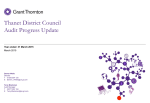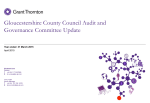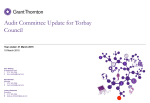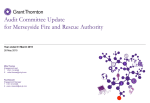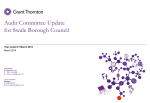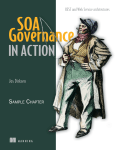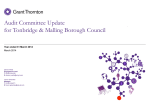Download The Audit Plan – template user guide
Transcript
Audit Committee Update for Swindon Borough Council Year ended 31st March 2015 21st April 2015 Liz Cave Engagement Lead T +44 (0)1173 057885 E [email protected] Chris Hackett Audit Manager T +44 (0)1173 057876 E [email protected] © 2015 Grant Thornton UK LLP The contents of this report relate only to the matters which have come to our attention, which we believe need to be reported to you as part of our audit process. It is not a comprehensive record of all the relevant matters, which may be subject to change, and in particular we cannot be held responsible to you for reporting all of the risks which may affect your business or any weaknesses in your internal controls. This report has been prepared solely for your benefit and should not be quoted in whole or in part without our prior written consent. We do not accept any responsibility for any loss occasioned to any third party acting, or refraining from acting on the basis of the content of this report, as this report was not prepared for, nor intended for, any other purpose. . Contents Section Introduction Progress at April 2015 Page 4 5-6 Emerging issues and developments Grant Thornton Local government issues Accounting and audit issues © 2015 Grant Thornton UK LLP 7-8 9-13 14-15 3 Introduction This paper provides the Audit Committee with a report on progress in delivering our responsibilities as your external auditors. The paper also includes a summary of emerging national issues and developments that may be relevant to you as a Borough Council. Members of the Audit Committee can find further useful material on our website www.grant-thornton.co.uk, where we have a section dedicated to our work in the public sector. Here you can download copies of our publications: • All aboard? our local government governance review 2015 • Stronger futures: development of the local government pension scheme • Rising to the challenge: the evolution of local government, summary findings from our fourth year of financial health checks of English local authorities • 2020 Vision, exploring finance and policy future for English local government • Where growth happens, on the nature of growth and dynamism across England If you would like further information on any items in this briefing, or would like to register with Grant Thornton to receive regular email updates on issues that are of interest to you, please contact either your Engagement Lead or Audit Manager. Liz Cave Engagement Lead T 01173 057885 M 07880 456128 Chris Hackett Audit Manager T 01173 057876 M 07880 456130 © 2015 Grant Thornton UK LLP [email protected] [email protected] 4 Progress at 21st April 2015 Work Planned date Complete? Comments 2014-15 Accounts Audit Plan We are required to issue a detailed accounts audit plan to the Council setting out our proposed approach in order to give an opinion on the Council's 2014-15 financial statements. 21st April 2015 Yes This is reported to the Audit Committee meeting in April 2015 when most of our interim work comprising our risk assessment will be complete. Interim accounts audit Our interim fieldwork visit includes: • updating our review of the Council's control environment • updating our understanding of financial systems • review of Internal Audit reports on core financial systems • early work on emerging accounting issues • early substantive testing • Initial work on the proposed Value for Money conclusion. January to April 2015 No – in progress We have met officers and discussed key issues including both accounts opinion issues and VFM issues. We have also undertaken some initial testing. Our detailed walk through of systems is completed. 2014-15 final accounts audit Including: July to September 2015 No This work will be completed in the summer to ensure we issue our opinion in line with the Government timetable. • audit of the 2014-15 financial statements • proposed opinion on the Council's accounts • proposed Value for Money conclusion. © 2015 Grant Thornton UK LLP 5 Progress at 21st April 2015 Work Planned date Complete? Comments Value for Money (VfM) conclusion The scope of our work to inform the 2014/15 VfM conclusion comprises: • An initial risk assessment; • A detailed review of arrangements against criteria specified by the Audit Commission; • Reviewing key documents; and • Discussions with officers. September 2015 No Other areas of work • Certification of claims and returns including the Housing Benefits claim. Other activity undertaken We have been liaising with officers to discuss issues affecting the year end accounts. November 2015 No On-going No © 2015 Grant Thornton UK LLP 6 All Aboard? - Local Government Governance Review 2015 Grant Thornton Our fourth annual review of local government governance is available at http://www.grant-thornton.co.uk/en/Publications/2015/LocalGovernment-Governance-review-2015-All-aboard1/. We note that the challenges faced by local authorities are intensifying as austerity and funding reductions combine with demographic pressures and technological changes to create a potential threat to the long -term sustainability to some organisations. Maintaining effective governance is becoming ever more complex and increasingly important. Against this background we have focused this year's review on three key areas: Governance of the organisation – the main area of concern highlighted in this year's governance survey is the level of dissatisfaction with the scrutiny process. Governance in working with others – there is an urgent need for scrutiny to exercise good governance over the complex array of partnerships in which local authorities are now involved. Boundary issues notwithstanding, by 'shining a light' on contracted-out activities and joint operations or ventures, scrutiny committees can bring a new level of transparency and accountability to these areas Governance of stakeholder relations – despite the work that a number of local authorities are doing with the public on 'co-production', almost a third of respondents to our survey did not think their organisation actively involves service users in designing the future scope and delivery of its services. We conclude that local authorities need to ensure that their core objectives and values are fulfilled through many other agencies . This implies a greater role for scrutiny and a need to make sure local public sector Bodies' arrangements are a transparent as possible for stakeholders. Hard copies of our report are available from your Engagement Lead or Audit Manager. © 2015 Grant Thornton UK LLP 7 Stronger futures: development of the LGPS Grant Thornton Our second review on governance in LGPS funds in England and Wales is based on comprehensive research with pension fund senior officers, supported by insights from pension fund auditors and is available at http://www.grant-thornton.co.uk/Publications/2015/Strongerfutures-development-of-the-LGPS/ With the local government pensions scheme (LGPS) continuing to face significant change and challenge, there is a clear commitment to ensuring its survival and the provision of affordable pension benefits for the future. Following the implementation of a career average pension scheme in 2014, administering authorities are preparing for significant changes in governance arrangements effective from April 2015. Some of the key messages from the report are: there are increasing strong examples of innovation and increased collaborative working across the LGPS to achieve reduced costs and improved use of specialist skills and knowledge; implementation of the career average scheme from April 2014 went well and demonstrated good project management and effective communication with members and employers; and there have been several other positive trends across the LGPS since our 2013 review particularly around the widening scope of reporting to Pension Committees including performance reporting, risk management and internal audit reviews. However, we saw a wide variation in practice, including a concentration of risk reporting on investment risk. Over half of funds have not implemented the CIPFA knowledge and skills framework as part of their member training, 45 per cent of Pension Committees do not receive internal audit reports and 15 per cent do not have specific internal audit coverage. Nearly half of funds have no information around the value of their liabilities in between the triennial valuations. Hard copies of our report are available from your Engagement Lead or Audit Manager. © 2015 Grant Thornton UK LLP 8 Independent Commission into Local Government Finance Local government issues The Independent Commission on Local Government Finance was established in 2014 to examine the system of funding local government in England and bring forward recommendations on how it can be reformed to improve funding for local services and promote sustainable economic growth. It published its final report, Financing English Devolution, on 18 February 2015. The report notes that the core of the Commission's proposition is the devolution of powers, funding and taxes to sub-national entities over a 10 year period. They estimate that this could lead to over £200 billion in public expenditure being controlled at a sub-national level. The expectation is that councils and their partners would work collaboratively to manage differences in capacity and resources. They see local areas becoming self sufficient. The Commission advocates a 'variable speed' approach to reform with 'Pioneers' able to and wishing to reform at a faster pace. Reforms advocated for all authorities include: • An independent review of the functions and sustainability of local government in advance of the next spending review • Freedom to set council tax and council tax discounts and full retention of business rates and business rates growth • Multi-year financial settlements • The ability to raise additional revenue through the relaxation of the rules on fees and charges 'Pioneer' authorities would also implement: • Single placed-based budgets for all public services • Management of funding equalisation across a sub-national area • Further council tax reforms including the ability to vary council tax bands and undertake revaluations • Newly assigned and new taxes such as stamp duty, airport taxes and tourism taxes • The establishment of Local Public Accounts Committees to oversee value for money across the placed-base budget. © 2015 Grant Thornton UK LLP 9 Inspection into the governance of Rotherham Council Local government issues On 4 February 2015 the Secretary of State for Communities and Local Government, Eric Pickles announced the publication of Louise Casey’s report . Her inspection of the exercise of functions on governance, children and young people and taxi and private hire licensing states: "Rotherham Metropolitan Borough Council is not fit for purpose. It is failing in its legal obligation to secure continuous improvement in the way in which it exercises its functions. In particular, it is failing in its duties to protect vulnerable children and young people from harm." It summarises the following serious failings: • a council in denial about serious and on-going safeguarding failures • an archaic culture of sexism, bullying and discomfort around race • failure to address past weaknesses, in particular in Children’s Social Care • weak and ineffective arrangements for taxi licensing which leave the public at risk • ineffective leadership and management, including political leadership • no shared vision, a partial management team and ineffective liaisons with partners • culture of covering up uncomfortable truths, silencing whistle-blowers and • paying off staff rather than dealing with difficult issues The report has had widespread press coverage and in a statement in the House of Commons the Secretary of State confirmed that he is considering exercising his powers of intervention in relation to Rotherham. © 2015 Grant Thornton UK LLP 10 Councils fear school place tipping point Local government issues Just ahead of the 15 January 2015 deadline for parents to apply for primary school places for their child for September 2015 the LGA warned that the £12 billion cost of creating places for the 900,000 extra pupils expected at England's schools over the next decade could push schools to breaking point. Whilst the government has committed £7.35 billion to create extra school places the LGA claims that this still creates a backlog. The LGA is calling on the Government to fully-fund the cost of all school places, now and in the future, and to give councils the powers to open new schools without bureaucratic burdens so they can be delivered according to local need. The LGA's ‘Investing in our nation's future' campaign outlines measures which it claims would save the public purse £11 billion, tackle the country's housing crisis, ensure every child had a place at a good school, reduce long-term unemployment, address the pothole backlog and improve the nation's health. © 2015 Grant Thornton UK LLP 11 Help into work programmes Local government issues In its press release of 12 January 2015 the LGA reported that more than one million unemployed people are falling through cracks in national work schemes that are failing to reach some of the most vulnerable jobseekers. It warned that whilst councils are being left to pick up the pieces to prevent more vulnerable people slipping further into long-term unemployment and disengagement they cannot afford to continue resolving the failings of these national schemes in their communities without the appropriate funding. As a remedy the LGA calls on the next government to commit to devolving all nationally-run education, skills and employment schemes to local areas so councils can join-up services to support their most vulnerable residents. A report published by the National Institute of Economic and Social Research (NIESR), commissioned by the LGA, explores in detail how a sample of councils across the country have provided a safety net for their most vulnerable and hardest to reach residents. The NIESR report's lead author, Dr Heather Rolfe, said: "Local authorities have a unique position in their communities, are able to bring services together, forging partnerships and strengthening referral networks. It is through such work that they are able to help unemployed people who are beyond the reach of national programmes." © 2015 Grant Thornton UK LLP 12 Care services for people with learning disabilities and challenging behaviour Local government issues The National Audit Office (NAO) published its report, Care services for people with learning disabilities and challenging behaviour on 4 February 2015. It concludes that the Government has not met its central goal of moving people with learning disabilities and challenging behaviour out of hospital by 1 June 2014, because it underestimated the complexity and level of challenge in meeting the commitments in its action plan. Following the exposure in May 2011 of abuse of patients at the Winterbourne View Hospital, the Department of Health set out its action plan in the ‘Winterbourne View Concordat’ for moving people with learning disabilities and challenging behaviour out of hospital and into community care. At September 2014 however there were still 2,600 inpatients with learning disabilities in mental health hospitals, although NHS England's stated ambition is to discharge 50% of these into "more appropriate care settings" by 31 March 2015. The NAO also report that there is no financial incentive for local commissioners to bring such patients home. They have to bear the additional costs of expanding local community services to meet the patients’ needs, following discharge from hospital, compared to when NHS England had centrally funded patients’ care in mental health hospitals. © 2015 Grant Thornton UK LLP 13 Provision for Business Rates Appeals Accounting and audit issues Unlodged appeals The Chancellor's Autumn Statement included a change to the rules relating to business rates appeals. As a result we do not expect to see any provisions for unlodged appeals in local authorities' 2014/15 accounts, although we will expect this to be re-considered for 2015/16 accounts. The change restricts also the backdating of Valuation Office Agency (VOA) alterations to rateable values. Only VOA alterations made before 1 April 2016 and ratepayers' appeals made before 1 April 2015 can now be backdated to the period between 1 April 2010 and 1 April 2015. The aim is to put authorities in the position as if the revaluation had been done in 2015 as initially intended, before the deadline was extended to 2017. There may be some fluctuations in provisions at 31 March 2015 as unlodged appeals provisions are released. However, there may also be increased numbers of appeals lodged prior to 31 March 2015. These appeals may be more speculative in nature and therefore authorities may need to consider whether prior year assumptions remain valid in estimating their provisions. Utilisation of provision As part of the provisions disclosures in the accounts, local authorities need to disclose additional provisions made in the year, the amounts used (i.e. incurred and charged against the provision) during the year and unused amounts reversed during the year. We understand that the software used for business rates may not provide values for the amounts charged against the provision during the year and that there is no simple software solution for this for 2014/15. Local authorities will need to consider available information and make an estimate of the amount for appeals settled in the year. © 2015 Grant Thornton UK LLP 14 Inclusion of overtime in the calculation of holiday pay Accounting and audit issues The Employment Appeal Tribunal (EAT) has delivered its judgement on the extent to which overtime pay should be included in the calculation of holiday pay. This case stems from an apparent conflict between UK law and European Law. The EAT found that non-guaranteed overtime (i.e. overtime, which is not guaranteed by the employer, but which the worker is obliged to work, if it is offered), should be included in the calculation of holiday pay. Back-dated claims can only be made if it is less than three months since the last incorrect payment of holiday pay. It is likely that there will be an Appeal to this decision. However that does not mean that authorities should hold off assessing the impact. Local authorities should be considering their own circumstances and if necessary taking their own legal advice as to the extent they might be affected by the ruling. If an authority is going to be affected they need to assess whether the liability can be reliably measured. For an authority likely to be affected in a material way, where it is possible to reliably measure that liability, then appropriate provision should be made in the 2014/15 accounts. The fact that the issue might go to Appeal at some uncertain time in the future is not of itself grounds for not including a provision. The chances of any success would need to be taken account of in the legal analysis but, in any case, there are some indications that the key issue on Appeal would be whether to remove the three month cap (if this were done then the provision would increase), rather than dismissing the entire decision to include overtime in the calculation of holiday pay. © 2015 Grant Thornton UK LLP 15 © 2015 Grant Thornton UK LLP. All rights reserved. 'Grant Thornton' means Grant Thornton UK LLP, a limited liability partnership. Grant Thornton is a member firm of Grant Thornton International Ltd (Grant Thornton International). References to 'Grant Thornton' are to the brand under which the Grant Thornton member firms operate and refer to one or more member firms, as the context requires. Grant Thornton International and the member firms are not a worldwide partnership. Services are delivered independently by member firms, which are not responsible for the services or activities of one another. Grant Thornton International does not provide services to clients. grant-thornton.co.uk © 2015 Grant Thornton UK LLP

















